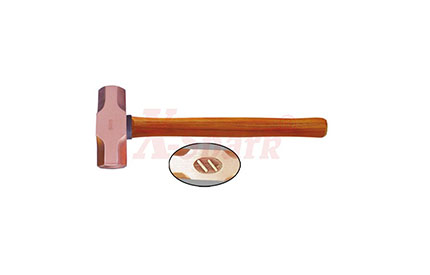In the following three cases, the spark that detonates is not generated by the explosion-proof tool itself, but by the working object. Therefore, the use of explosion-proof tools cannot prevent this explosion, but other explosion-proof methods must be used.
1. Explosion-proof tools may produce sparks when they collide with rocks.
In this case, the spark generation has nothing to do with the metal.
When ruptured under tension, the mechanical energy of the impact becomes electrical energy. This electrical energy is released in the form of electric sparks. Sparks are especially easy to produce in rocks that contain quartz, silica, and sandstone. Generally speaking, in rocks, the higher the content of quartz, or the larger its particles, the easier it is to ignite. This phenomenon can be proved by pouring gasoline on the rock and hitting the rock with ordinary chisels and explosion-proof chisels. To prevent explosion accidents, the rock can be immersed in water before operation.
2. When tools (no matter steel products or explosion-proof tools) hit or rub hot steel workpieces (pipes, hot containers, bolts, nuts, etc.) coated with aluminum coating, there is a possibility of sparks that can ignite explosive substances.
3. If the powders of aluminum, magnesium, and their alloys slightly adhere to the surface of rusty (iron oxide) steel, a violent exotherm may occur when they are hit by hard objects or even hard rubber or plastics. The thermite reaction" is likely to detonate.

Copper Sledge Hammer
How to extend the service life of explosion-proof tools
After we use the Copper Sledge Hammer, proper maintenance of it plays a very important role in the life of the tool:
1. Always store the explosion-proof hammer in a dry place.
2. In our daily work, after 20 consecutive hits, the surface attachments of the hammering explosion-proof hammer should be treated in time, and then used after cleaning. Do not use continuously, so as not to be hit for a long time. Friction will heat the tool.
3. After using the explosion-proof hammer, wipe off the dirt and deposits on the surface, and then store it in a dry place.
4. Percussion tools, such as explosion-proof copper hammers, percussion wrenches, etc., cannot be hit continuously. There should be a suitable interval for more than ten times. At the same time, the debris adhered to the product must be removed in time before continuing to use. If the hammer is hit on the surface of the tool Containing other metal hard particles, it may cause sparks when hammered again, resulting in an explosion.
5. Cutting edge tools should be placed in the sink and gently touch the grinding wheel for sharpening. Do not use excessive force and contact the grinding wheel for too long.
6. Clean the surface oil stains before using various products, and remember to use the explosion-proof hammer correctly according to the instructions.
评论
发表评论